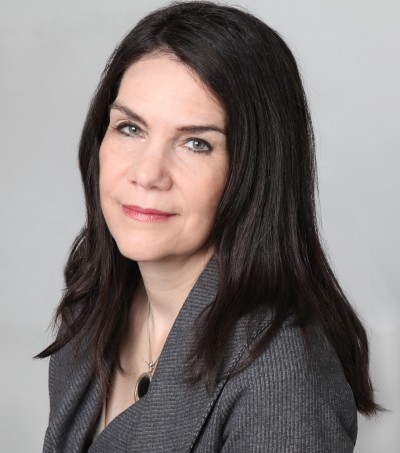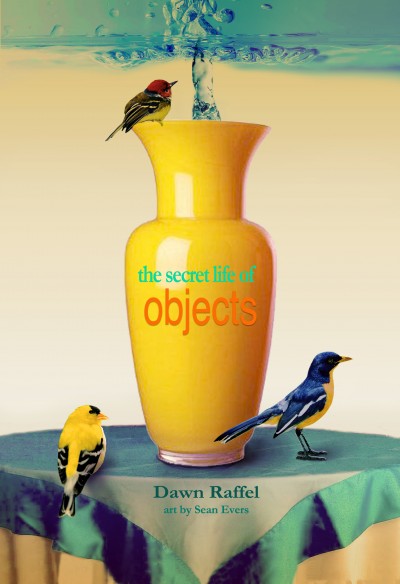
by Yona Zeldis McDonough
A Conversation With Dawn Raffel
 Dawn Raffel is a brilliant miniaturist. From her exquisitely crafted short stories (In the Year of Long Division, Further Adventures in the Restless Universe) to her slender but ice-pick sharp novel (Carrying the Body), her canvas may be restricted but it is never slight; Raffel finds big meaning in the seemingly small, be it word, gesture or in, the case of her newest book, object. That book, fittingly called The Secret Life of Objects, is a collection of prose poems/love songs/tributes to the stuff—a mug, a pair of lamps, a sewing box, a ring—that make up the warp and woof of her daily life. Raffel answered questions posed by Lilith’s fiction editor, Yona Zeldis McDonough, about the genesis of her newest collection, where she finds inspiration and the surprises that she uncovered when she was willing to probe just a little bit deeper.
Dawn Raffel is a brilliant miniaturist. From her exquisitely crafted short stories (In the Year of Long Division, Further Adventures in the Restless Universe) to her slender but ice-pick sharp novel (Carrying the Body), her canvas may be restricted but it is never slight; Raffel finds big meaning in the seemingly small, be it word, gesture or in, the case of her newest book, object. That book, fittingly called The Secret Life of Objects, is a collection of prose poems/love songs/tributes to the stuff—a mug, a pair of lamps, a sewing box, a ring—that make up the warp and woof of her daily life. Raffel answered questions posed by Lilith’s fiction editor, Yona Zeldis McDonough, about the genesis of her newest collection, where she finds inspiration and the surprises that she uncovered when she was willing to probe just a little bit deeper.
Did you know you were writing a book from the outset?
The whole thing happened very fast. One morning I was drinking coffee from the mug I always take from my cupboard, even though I have a dozen other mugs. I go straight to that one because I took it from my mother’s house after she died, and for me it contains not only coffee but also a whole story about my mother and my aunt. Then I realized that I have a house full of objects like this—things that have a secret personal value that far transcends their surface worth. I wrote them all down very quickly, resisting the urge to over-analyze; it felt like creating a watercolor where you don’t want to muddy things with too much revision. When I was done I saw that what I had written was a book and that it told a life story.
How did you go about organizing these pieces?
I wrote these in the exact order you see them in the finished book, which was intuitive. At one point, an editor asked me to organize the book chronologically, ordering the objects by when I received them. For me, that effort fell flat, I think because so many of the objects are saturated with stories from multiple generations, and in part because memory and feeling simply aren’t linear.
You wrote that you were surprised to find your father’s Jewish prayer book after he died; did this discovery revise your understanding of who he was?
My father claimed to have no interest in organized religion and would cheerfully describe himself as a born-again atheist. And yet he was a spiritual person and an ethical one. He’d have given you the shirt off his back if you needed it. I think the prayer book drove home how deeply Jewish he was, no matter what he said. It was simply part of his being and he understood that.
What about your mother’s bible?
That didn’t surprise me—she was open about never leaving on a trip without it. She was very proud of her identity as a Jewish woman, while at the same time offended by rituals she considered sexist. She was so happy to see the emergence of women rabbis. One year she was in the hospital during her own mother’s yahrzeit, and one of the Reform women rabbis from her synagogue came to say the mourner’s kaddish with just my mother and me. There wasn’t a minyan, and to us it didn’t matter; it gave my mother tremendous comfort.
 Many of these pieces are prompted by loss, either through death or other kinds of absence; do you feel that the objects you describe are an attempt to resist or compensate for those losses?
Many of these pieces are prompted by loss, either through death or other kinds of absence; do you feel that the objects you describe are an attempt to resist or compensate for those losses?
Nothing compensates for those losses. But I do feel the objects hold some sort of residue of the lives they’ve touched. I dedicated the book to my children because I wanted them to have a record—a catalogue, if you will—of who their grandparents and great-grandparents were, and who their mother was too!
You wrote that your family did “deny” being Jewish, but not “advertise” it either; how has this unspoken rule shaped your own feelings about religion and faith?
Wow, that’s a hard question. My parents were dealing with the fact that it was socially acceptable for people to be openly anti-Semitic in the 50s and 60s in the Midwest. And their whole generation was so deeply imprinted by the Holocaust; I don’t think we can underestimate the psychological, emotional, and spiritual trauma they endured, even as Americans, and the many ways that played out. As for me, as a young woman—because my name doesn’t telegraph that I’m Jewish— I was sometimes slow to volunteer that information. Coming to New York, it was a lot easier to be Jewish, but I also went through my own period of being an atheist and not wanting anything to define me. When I finally “came back,” it was to a progressive Conservative synagogue. I think my comfort with it can be attributed to finding a congregation where I feel I can grow, and to being at an age where I have a better understanding of who I am, and to being in a place where I don’t have to hide or face consequence. I am fortunate to live in such a good time and place to be a Jewish woman.